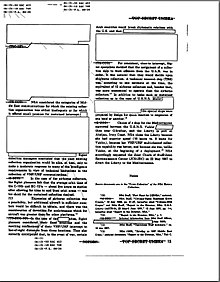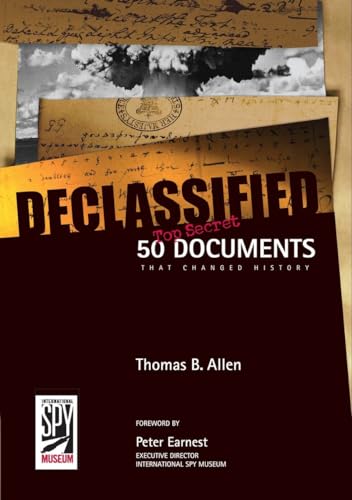Declassified: 50 Top-Secret Documents That Changed History
Free download. Book file PDF easily for everyone and every device. You can download and read online Declassified: 50 Top-Secret Documents That Changed History file PDF Book only if you are registered here. And also you can download or read online all Book PDF file that related with Declassified: 50 Top-Secret Documents That Changed History book. Happy reading Declassified: 50 Top-Secret Documents That Changed History Bookeveryone. Download file Free Book PDF Declassified: 50 Top-Secret Documents That Changed History at Complete PDF Library. This Book have some digital formats such us :paperbook, ebook, kindle, epub, fb2 and another formats. Here is The CompletePDF Book Library. It's free to register here to get Book file PDF Declassified: 50 Top-Secret Documents That Changed History Pocket Guide.
Contents:
These reports remain among the best sources of information regarding intelligence and covert operations during the Cold War. The debate is quite interesting and reveals a number of historically significant facts, which are unavailable elsewhere. In , the CIA did declassify several hundred pages of materials on domestic spying and covert operations, sometimes referred to as the Agency's " Family Jewels. Especially useful is a group of declassified intelligence documents on the the Soviet Union during the period the documents are from the CIA's predecessor, the Central Intelligence Group; the documents are from the CIA.
The CIA has its own document search site , for previously released materials. Covert Action and Counter-Insurgency Programs ", published in as an attachment to a volume on Africa. For a series of guides to the CIA's own official declassified archives, click here. A good feature of this website is that it will produce a network map, showing how the person in question is connected to a web of other figures and institutional interests. However, you should make sure to check carefully the sources noted in Namebase; some of these are mainstream, reliable sources, while some are more dubious.
The report is very interesting and it contains details about the role of U. Historian David M. Barrett paraphrases the report as follows:. The tenor of the conversation was that it was time for the U. They included burning sugar cane fields, ruining refineries, interrupting electric power supplies, and putting an embargo on food and medicines going into Cuba At a minimum The important topic of corporate and business influence on foreign policy is inherently difficult to research, as there is no mandatory document declassification for the private sector.
However, there are a few good sources. There are some archival collections of varied qualify pertaining to prominent business figures with political ties. One source is the collection of papers from Thomas Lamont, a key figure from the Robber Baron era and a banking partner of J. The Lamont Papers , located at Baker Library, Harvard Business School, contain extensive documentation on business influence in a wide range of domestic and foreign policy issues, during the first half of the twentieth century.
Data on the role of money in recent U. It also has a search engine called Find a Lobbyist.

The leaked Panama Papers , concering off-shore financial activity are now availabe in a searchable database. Publicly traded companies must file detailed reports with the U.
Securities and Exchange Commission. Most of these latter databases are proprietary; however similar resources should be available at most research libraries.
The President Executive Order 13526
The various biographical directories and "Who's Who" volumes often contain business affiliations. If you want to investigate a particular person -- to find out, let us say, their business or political ties -- this is the place to start. Bear in mind that people are only included in the Who's Who volumes if they want to be included, and these biographies are usually not always written by the individuals themselves.

Accordingly, the most embarrassing details of people's lives are usually omitted. So, you should read these biographies carefully. Run by the liberal Inter-Hemispheric Resource Center, this is a well organized and factually accurate site. It contains data pertaining to their personal biographies, political backgrounds, and corporate links; it has footnotes to sources.
Namebase , discussed above, in another good source to explore specific individuals and their business connections. William Domhoff's web site , both of which provides links to numerous sites. The whole multi-volume series of documents has been scanned. The best way to obtain declassified materials is of course to go to the archives themselves. Regarding the major collections: There are detailed sites for Presidential Libraries and the U. National Archives ; these contain a significant number of digitized documents, readily available without charge.
Also, this Department has published an on-line volume of interpretative essays regarding the early Cold War, Canada and the Early Cold War , The volume is in effect an official history, and it should be viewed with the same skepticism accorded to the FRUS volumes, discussed above. This should also be available at most research libraries. Note that these official archival collections tend to overstate the salience of official government activity in international relations, and to understate the influence business organizations and private sector groups.
No results
The latter are not required to release of documents to the public and they are, accordingly, far harder to study. For researchers on the Kennedy assassination, the U. The Miller Center at the University of Virginia has made available recordings of presidential conversations, during the period The recordings are difficult to decipher; however, the site also contains transcripts of presidential conversations for the Kennedy, Johnson, and Nixon presidencies. Available online, the report is entitled, Justice Delayed is Justice Denied.
FOIA was originally created in , but only became effective in , with a series of legislative amendments. Officially, the Freedom of Information Act is designed so that any citizen can write an agency requesting information, and can get it; the agencies are required to waive search fees if the FOIA request is primarily in the public interest, i. Agencies must disclose the requested materials -- to affirm the people's "right to know" -- unless there is a compelling reason to keep the material secret.
In practice, however, FOIA is extremely difficult to use. There is a basic conflict of interest in its operation: It is up to each specific agency to determine whether the law is being obeyed. One can appeal a negative decision, but the review takes place within the specific agency from which you are seeking documents, and there is a built-in bias against granting access.
The only way to get an "impartial" hearing is to go to court, which is quite expensive. And the courts have not been particularly sympathetic to researchers in recent years. The entire process, including appeals, required some three years. At one point, I had to use the services of an attorney he helped me pro bono , though I did not actually go to court. I did obtain about two thousand pages of declassified documents from the State Department heavily censored prior to release.
But the process was time consuming, to say the least. Condition: New. Seller Inventory Book Description Penguin Random House.
Brand New. Book Description National Geographic, Language: English. Brand new Book. Seller Inventory BZV Seller Inventory BTE Seller Inventory M Seller Inventory BD Seller Inventory NEW Publisher: National Geographic , This specific ISBN edition is currently not available. View all copies of this ISBN edition:. Synopsis About this title Culled from archives around the world, the 50 documents in Declassified illuminate the secret and often inaccessible stories of agents, espionage, and behind-the-scenes events that played critical roles in American history.
About the Author : Thomas B.
- Declassified : 50 top-secret documents that changed history |.
- Barrons Visual Dictionary: Italian: For Home, Business, and Travel.
- Peter Earnest: Spy Vs. Spy | WBUR News.
- Thomas B. Allen - Author's Biography.
Buy New Learn more about this copy. Other Popular Editions of the Same Title. Search for all books with this author and title. Customers who bought this item also bought. Stock Image.
Declassified: 50 top-secret documents that changed history
Published by Natl Geographic Society New Hardcover Quantity Available: 1. Revaluation Books Exeter, United Kingdom. Seller Rating:. Published by National Geographic. New Quantity Available: Published by Penguin Random House. Mediaoutlet Springfield, VA, U.